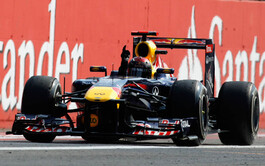


15/09/2025
NEWS STORY
 Four-time world champion Max Verstappen laments the direction in which the current generation of F1 cars are heading, fearing they limit the racing.
Four-time world champion Max Verstappen laments the direction in which the current generation of F1 cars are heading, fearing they limit the racing.
For as long as anyone can remember, the sport's powers that be have been coming up with rules designed to improve the action, particularly in terms overtaking, and for as long as anyone can remember they have failed.
Now we have DRS trains, whole groups of car that essentially play follow-the-leader from lights to flag, and while the much loathed gimmick is dropped from next year will 'push to pass' improve the situation.
Verstappen believes that the sport should be looking at smaller, lighter cars but admits that this would also require a rethink in terms of engines.
"What is most important is lighter cars, smaller cars," he told reporters in Monza last weekend. "But you can only really do that if you change the engine regulations.
"At the moment, the engines are super-efficient," he continued, "but they are also quite big. That makes the car longer, you need more cooling, so the car becomes quite big.
"I think if we can get a similar type of car like they were in the 2010 era, or even before, that would be nice, because I think it will help the racing. But at the end of the day, I'm not the one deciding."
His comments come ahead of one of the biggest overhauls of the regulations in living memory, and at a time FIA president, Mohammed ben Sulayem, has been thwarted twice in his bid to have the sport revert to V8s.
The move to 50/50 ICE/Electric is what has encouraged new manufacturers to enter the sport and others to remain, and they have made it quite clear that they would never have invested the vast sums that they have had it been proposed that the sport was considering reverting to a 90/10 split V8 as championed by the FIA president.
Of course, Red Bull is now one of those manufacturers and with continued doubt over how good a job they might do, a cynic might suggest that this could be what is fuelling Verstappen's concern.
"It's a big question mark," he admitted, "but honestly I think there are not many people that can say right now, 'yes, we are going to be really, really good'.
"You don't have any guarantees. I know it's a big challenge what we are doing, with also bringing our own engine, but it's also quite an exciting challenge. It also gives us the best opportunity of being competitive instead of being dependent on another car manufacturer that is willing to give us an engine.
"The regulations are so complex that, of course, the engine is going to be super important, but you also need to make sure that you build a good car," he insisted.
"I think the first few races will be very challenging for everyone to integrate everything very well, from the power unit to the car and the behaviour in general, so hopefully it can give you some interesting races."